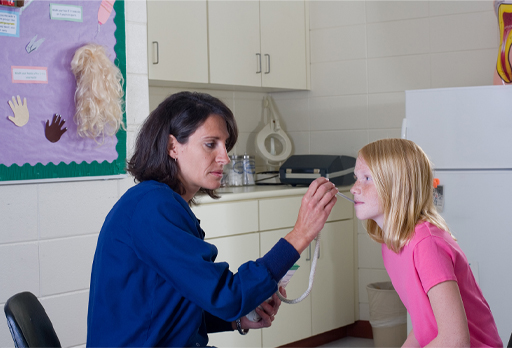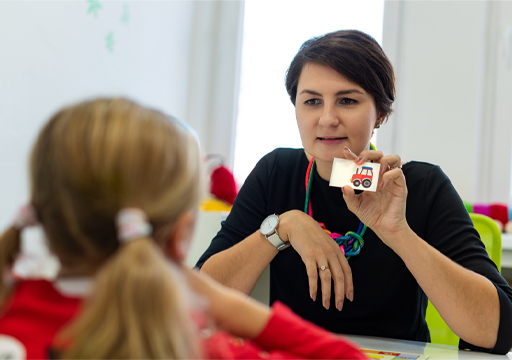1 Professionals involved in children’s mental health
There are many health and social care professionals who work to support, treat and ultimately to improve the mental health of children.
Here are examples of professionals who may work with children, and their roles and responsibilities.
Educational psychologists: have studied psychology and have taken additional training and study to specialise in working with children and families in education settings. Psychologists are not medical doctors (which include psychiatrists) and therefore do not prescribe medication. They can assess children and recommend interventions to support children experiencing social and emotional difficulties.
Activity 1 The role of an educational psychologist
Watch the following interview with Liz talking about her work as an educational psychologist (about 5 minutes). Then reflect on each of the questions that follow and make a note of your responses. Watch the clip a few times if that helps you recall what was said.
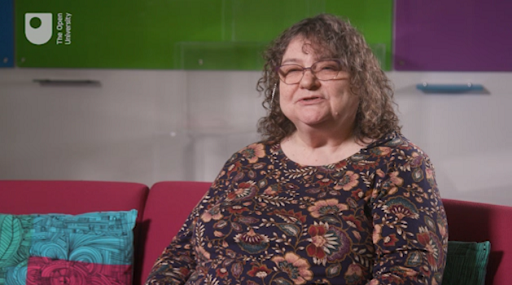
Transcript: Video 1
Part 1
What kinds of work do educational psychologists do?
Discussion
Liz described a range of different tasks and how these might also depend on the expertise and interests of the individual psychologist. Visiting schools and talking with staff, children and parents were mentioned, as was training.
Liz talked about managing assessments of pre-school children herself, as well as having responsibility for children with specific learning difficulties (such as dyslexia) and those with social and emotional issues.
Part 2
What other people and professionals might educational psychologists work with?
Discussion
Liz talked about working in a team with other colleagues and also how important it was to liaise with mental health teams, social workers and systems that surround the individual child. You may recall that these systems have been mentioned throughout the course.
Part 3
What is important to consider when assessing individual children?
Discussion
Liz explained how the ‘whole child’ needs to be seen as part of systems that includes the family and the school that the child is interacting with daily. The child is the central focus, but should never be perceived as an isolated individual.
Part 4
What does Liz suggest is one of the most important skills to have?
Discussion
Throughout the course, but particularly in Session 5, you’ve considered the importance of listening to the child. Here, Liz emphasises the need for the same skill but with a wider application, stressing the need to listen attentively to all those involved with the child – including the child themselves of course – in order to find out how each person perceives the situation. Such listening can be very intense and tiring, especially when this involves hearing about adverse childhood experiences first-hand on a day-to-day basis, which is also why Liz highlights the need for professionals to take care of their own health and wellbeing to avoid ‘burnout’.
Part 5
Why does Liz suggest that the role is not being a ‘problem solver’?
Discussion
Liz brought in an interesting metaphor of the work being similar to a detective gathering evidence from everyone so that a bigger picture of the child and the problem or situation can be ‘drawn up’. In this way, ideas can be thought through with others, including the child themselves, and the problem might even be reframed or perceived in a different light.
Health visitor: a registered general nurse who has done additional training to become a registered health visitor. Their role is primarily public health orientated and specifically focuses on working with children aged 0–5 years and their families.
Psychiatrists: medical doctors who have taken further training to study the speciality of psychiatry. Child and adolescent psychiatrists have specialised further and work with children with mental health conditions in both the community and inpatient mental health units. Psychiatrists can diagnose mental health conditions, prescribe medication, provide psychotherapy (i.e. talk-based therapies) and make recommendations for other interventions. They usually work in NHS-funded multidisciplinary teams with other professionals, including mental health nurses.
School nurse: a registered nurse who has done additional postgraduate training to become a specialist in children’s physical and mental health.
Social workers: support children and their families, helping to protect children’s rights and safeguarding children. They build relationships between agencies and help advocate for the child and ensure they receive the formal supports and resources that they are entitled to.
Special educational needs coordinators: often referred to as SENCOs. This role is statutory as part of the Special Education Needs and Disability (Department for Education and Department for Health and Social Care, 2014) legislation, which requires education settings to have a designated teacher who coordinates the special educational needs of children.
Activity 2 The role of the SENCO
Watch the following clips from an interview with Christine about her role as a special educational needs coordinator. You can either watch the clips all together or one at a time at your own pace.
Part 1
As you watch the first clip, make some notes in response to the following:
- how Christine explains what is meant by the role being ‘mandatory’
- what the routes for referral and identification of special needs tended to be
- how social and emotional difficulties tended to be seen by staff.
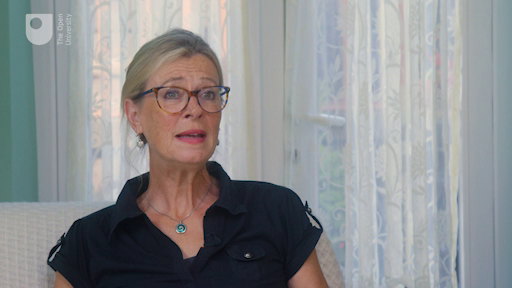
Transcript: Video 2
Part 2
As you watch the second clip, reflect on the following question:
- How did Christine attempt to look behind the presenting behaviour of the child?

Transcript: Video 3
Discussion
You may have noticed how Christine attempts to think about the behaviour from the child’s perspective and what they might be attempting to express. As you have seen in previous sessions, all behaviour is a form of communication, which is understandable as very young children do not always have the ability to express themselves clearly using words alone. It is the responsibility of adults to find out as sensitively as possible how children are understanding the world around them and the relationships they experience.
Part 3
In the third clip Christine discusses how the school attempted to access wider support services. Reflect on the following:
- What kinds of support were available?
- What were the challenges at the time of accessing external mental health support?
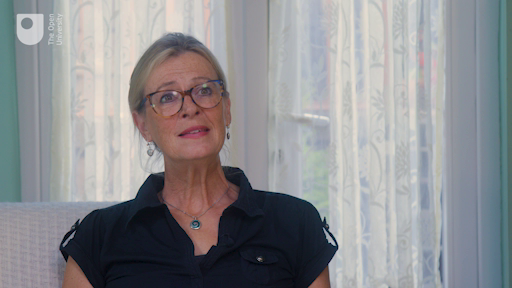
Transcript: Video 4
Discussion
At the time that Christine was SENCO, the school was unable to make direct links to mental health services and had to make referrals through over-stretched GP practices. As you may recall from Session 5, there is an increasing demand for effective and joined-up thinking due to recent government initiatives for more coordinated mental health support teams.
Part 4
The fourth clip highlights the important relationships Christine built up with parents in a very sensitive way. Note how she describes parents as ‘our allies’ in school.
Reflect on the story Christine narrates of one child, and the role of curiosity and listening to parents and the child that helped the communication process evolve in such a positive way.
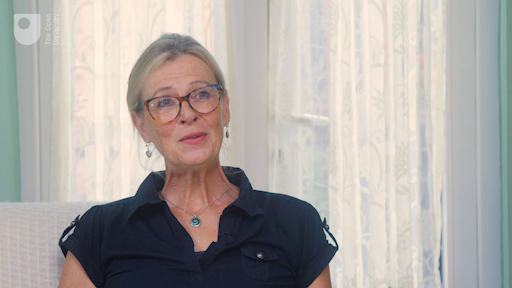
Transcript: Video 5
Part 5
As Christine reflects on her role in the last clip, notice how she stresses the conflicts that inevitably arise within the role, but also how keeping the child’s welfare as central and helping the child to have a ‘voice’ that can be heard by others can ultimately make a difference.
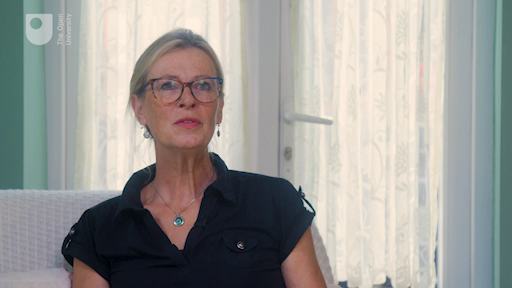
Transcript: Video 6
Teaching assistants: perform many important roles within schools, either working alongside the class teacher with targeted children who have special needs, or with small groups of children to help boost maths and literacy skills in particular. In more recent years their role has expanded, and some teaching assistants with higher-level formal qualifications have received further training to help them to nurture the wellbeing of children throughout the school.
Mental health nurses: Some mental health nurses have received further training and work in Child and Adolescent Mental Health Services (CAMHS) either in the community or in inpatient units, making them experts in supporting children with mental health conditions. Other health and social care professionals also specialise in child and adolescent health and work in CAMHS too, including social workers, practitioner psychologists (including clinical psychologists), child psychotherapists (specialists in talk-based therapies) and occupational therapists.
Therapist: A range of specialists who are skilled in a particular therapy or field, which can include the disciplines of speech and language therapy, psychotherapy, family therapy (where a therapist works together with the family unit in systemic therapy) and occupational therapists. All can make a valuable contribution to children and their mental health.

